
Sol Solutions – Fall 2012 print ed.
By Andrew Joseph, Features Editor; Cole Garside, Photographer
General Cascades Norampac PAC - The Packaging Association Sol Cuisine soybeans theadlibgroup tofuPAC members help Canadian tofu processor spruce up its retail packaging to grow new export markets
It’s safe to say that going vegan has never been easier than it is these days—thanks to a plethora of tasty and flavorful meatless meal alternatives enabled by the culinary versatility and growing popularity of tofu—a long-enduring southeast Asian food staple derived from soy bean curds packing a healthy protein content rivaling that of many meat products at a fraction of the calories, and without high cholesterol risks and other associated health threats.
Widely acknowledged as a viable meat substitute in many popular North American-style dishes, tofu has long overcome its early consumer perception problem in North America as being a bland and tasteless filler food, according to Jess Abramson, vice-president of sales and marketing at the fast-growing soy processor Sol Cuisine Inc. in Mississauga, Ont.

Sol Cuisine vice-president of sales and marketing Jess Abramson shows off some of the tofu and soy-based products processed at the company’s Mississauga facility.
“That perception certainly is not correct at all,” Abramson asserts. “Be it soft or firm, raw or cooked, tofu definitely has its own taste, smell and texture—with large differences in each of these properties dictated both by the particular soy bean used to make it and the manner in which the tofu is made.”
By any measure, it is made in a very fine manner indeed at the company’s 11,500-square-foot production facility located about a 30-minute drive west of Toronto, which employs 20 people to turn out a growing range of organic, wheat-free and gluten-free Halal– and Kosher-certified vegetarian burgers and breakfast patties.
According to Abramson, the plant has capacity to make 7.5 million veggie burgers per year, along with 4.5 million units of vacuum-sealed firm tofu blocks that can be used as a main protein ingredient across a wide variety of modern recipes traditionally relying on meat—amounting to nearly two million pounds of product combined.
“We really are tofu-obsessed,” Abramson told Canadian Packaging during a recent visit to the neat-and-tidy, HACCP (Hazard Analysis And Critical Control Points)-certified Mississauga facility, relating the company’s origins tracing back to 1980.
Originally called Soy City Foods, the company started out trying to fill an existing void in the Toronto vegetarian restaurant business landscape created by the absence of a reliable supplier of fresh high-quality tofu, relates Abramson, soon after expanding into the foodservice industry and, eventually, the retail sector.
In 2002, Soy City joined forces with Second Nature—a Toronto-based veggie burger producer primarily supplying high-school cafeterias in and around the city—to form the aptly-called Sol Cuisine.
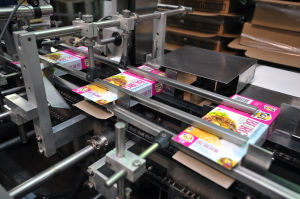
A Nordale cartoner assembles the paperboard cartons, supplied by Cascades, used for packaging Sol’s meatless burgers for retail sale.
“Sol is the Spanish word for ‘Sun,’ but we also hold it to stand for ‘Sustainable,’ ‘Organic’ and ‘Local’—the three core values that have guided us for over 30 years,” says Abramson, claiming the company to be the first Canadian manufacturer of organic tofu—sourcing its whole soybeans from a farm in Ripley, Ont.
“Working with this farm helps ensure our continuous access to the precious, organic, Non-GMO (genetically-modified organisms) soybeans, which are farmed sustainably and purchased for a fair price,” explains Abramson.
“Because of our colder climate, Ontario-grown soybeans actually contain a higher protein content and hence are considered to be among the best in the world,” says Abramson, adding that offering a largely gluten-free soy product to the vegetarian food market—along with appealing texture and taste profile—has enabled the company to cultivate a strong brand loyalty among its main customers and consumers.
“Even when it came to healthy options, in years past most of the veggie-based manufactured products out there utilized gluten as a binding agent, but about 90 per cent of the Sol Cuisine product line is gluten-free,” states Abramson, adding the company recently had its retail products certified both wheat- and gluten-free through the Celiac Sprue Association.
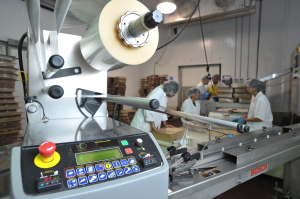
Sol Cuisine utilizes a Doboy Stratus flowwrapper, manufactured by Bosch Packaging Technology, to make its burger retail packs.
According to Abramson, growing consumer awareness of health issues, along with increasing popularity of vegetarianism and consumption of organic foods, have also made a significant contribution to the company’s rapid growth over the last decade.
Under the leadership of company president Dror Balshine, the company managed to post double-digit annual sales growth over the past decade in large part to continuous product innovation—as reflected by 13 different SKUs (stock-keeping units) retailed across Canada by a growing base of natural-food, co-op and independent grocery stores, as well as leading supermarket chains including Loblaws, Sobey’s, Metro, Superstore, Whole Foods, Safeway and Overwaitea Foods.
Since the summer of 2011, the company has also made some important inroads to the U.S. marketplace, where leading organic foods retailer Whole Foods Market now carries its top-selling line of veggie burgers—in about 40 different states, according to Abramson.

All burgers processed at the Sol Cuisine plant pass through the IQ2 metal detector from Loma Systems to ensure strict quality control.
“Despite our success in Canada, we wanted to grow by seeing if there was a market for us in the U.S.,” Abramson recalls. “But because there were already so many veggie product choices on the market, as an unknown brand we needed to pop out.
“Specifically, we needed a way to make our packaging a focal point for our products.”
To achieve that goal, Sol Cuisine turned to the Toronto-based boutique marketing agency the adlib group inc., to develop a new high-end package for the U.S. market that would effectively tell the brand’s story in a novel, eye-catching manner.
“We introduced a color-coding system that definitely created a brighter shelf presence, while allowing easier identification of different SKUs at a glance,” relates Jesse’s father and the adlib group president Michael Abramson, himself a long-time vegetarian and an avid consumer of Sol Cuisine tofu products for about 10 years.
“The color panel also houses the Sol Cuisine logo and the great nutritional attributes like wheat- and gluten-free and vegan—letting the packaging become both a salesperson and educator at shelf level.”
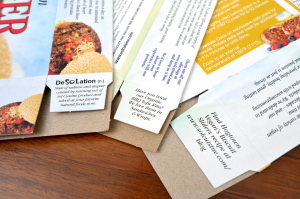
The raw Tofu packs and the soy-based vegan burger packaging were designed by the adlib group, which also implemented a suggestion from Cascades to make full use of packaging real estate on the side-panels and the inner layer of the box to make a better consumer connection.
Adds the adlib group’s creative director David Brouitt: “We set out to refresh the Sol Cuisine brand to create one that reflected a bright, optimistic, and playful persona.
“Specifically, we recommended that Sol move away from their existing packaging that featured a farm scene background with very little to distinguish one SKU from the next,” Brouitt expands.
“We maintained the sky image from the original farm scene but lightened up the rest of the package so that the photo of the product was more prominent,” he relates, “and we also introduced an identification panel using bold colors to maximize consumer eye-appeal and product differentiation.”
Because good packaging presentation is now an essential ingredient of Sol Cuisine’s marketing strategy, according to Jess Abramson, last year the company turned to one of Canada’s leading recycled paperboard products manufacturers and PAC founding member Cascades Inc.—a switch that has already yielded some improvements in packaging, along with the environmental bonus of using exclusively FSC (Forest Stewardship Council)-certified paperboard for its flagship brand veggie burgers.
Abramson says that the pre-printed paperboxes supplied by the Cascades’ nearby manufacturing operation in Mississauga, Ont., provide a quality freezer-safe packaging substrate that won’t warp under intense cold, while the special color inks used by Cascades ensure a far superior and more consistent color reproduction than the process CMYK inks used on the earlier boxes, which had the colors of the company’s logo noticeably varying from run to run.
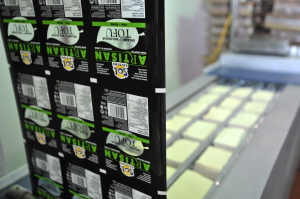
Fresh whole GMO-free soybeans are processed into blocks of tofu and quickly packaged inside high-barrier plastic on the Multivac model M855 gas-flush thermoforming machine, which uses various grades of packaging films supplied by Winpak, Taipak and Packall.
For foodservice customers like the popular upscale Hero Certified Burgers chain, Sol Cuisine uses Norampac (division of Cascades) converted corrugated cartons to pack 30 burgers—5.5 kilograms of product—to a box.
Says Abramson: “The printing presses used by Cascades allow us to run our small production runs quickly, which has helped us with our often tight deadline… and helping us grow our business.
“We have noticed a 10-percent spike in sales after the introduction of the new packaging here in Canada,” relates Abramson, while complimenting Cascades for making full use of the paperbox packaging’s real estate—including side-flaps and the inner surface—to provide consumers with recipes, product recommendations and other company information linked directly to the company’s website.
In fact, the launch of the new burger packaging in the U.S. got such a great response, that Sol Cuisine was sold on bringing the packaging to the Canadian market.
The Sol Cuisine veggie burgers start out at the plant’s Formax 6 patty former manufactured by Provisur Technologies, which shapes the product and slips in a wax sheet of paper underneath each patty to facilitate easy product separation, after which they are conveyed into a spiral freezer capable of freezing up to 2,000 pounds of product per hour.
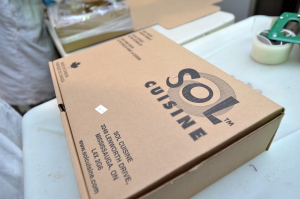
Corrugated packaging producer Norampac, a division of Cascades, supplies Sol Cusine with high-quality corrugated shipping cartons for its foodservice industry customers.
The frozen patties are then subjected to a thorough product quality inspection by traveling through the high-accuracy IQ2 metal detection system from Loma Systems, after which they are either hand-packed 30 to a box for foodservice customers—using Cascades-made corrugated cartons—or conveyed on to the Doboy Stratus flowwrapper from Bosch Packaging Technology Inc., which quickly packs the burgers two at a time to produce the inside film package.
Operated via an Allen-Bradley PanelView 300 micro monochrome terminal from Rockwell Automation, an automatic Nordale cartoner then springs into action by building paperboxes from flats to complete the primary packages, which are then marked with the lot number and best-before date by an A320i inkjet printer from Domino Printing Solutions and finally sealed using the Pro Blue adhesive system manufactured by Nordson Corporation.
The finished packages of burgers then move onto a circular holding tray—manufactured by Feed Rite Automation Inc.—where they are packed into the Cascades-made corrugated shipping cartons.
Along with the burgers, Sol Cuisine creates an artisan-like, hand-crafted organic tofu product, a fact that when the adlib group looked at, they realized they needed to tell that story with a newly designed package.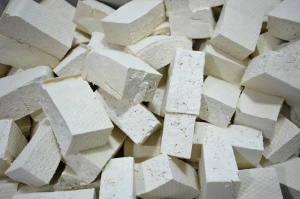
“To achieve that, we recommended a sleek black package that called out Sol’s unique product features, while also including a clear window in the plastic film so the consumers can easily see the actual real product for themselves,” says Michael Abramson. “This package helped Sol Cuisine make a great splash into the Canadian market.”
It’s a slightly different packaging process for the firm raw tofu products, whereby pre-cut blocks of tofu are carefully hand-placed into an older-model M855 gas-flush thermoforming machine, manufactured in Germany by Multivac GmbH to remove the air from the square-shaped thermoformed plastic film packs—manufactured with high-quality barrier film supplied by Taipak, Winpak and Packall—and securely vacuum-seal them three at a time.
After moving through the IQ2 metal detection system for a final quality assurance check, the firm tofu packs are then placed into a pasteurization system and heated up to internal temperatures of 75 C to 80 C for about an hour-and-a-half—a process that enhances the shelf-life of the tofu.

A Domino A320i inkjet printer applies best-before and lot code data to Sol Cuisine’s colorful retail cartons of flavorful soy-based vegetarian burgers.
After overnight storage in a cooler, the tofu packs are then hand-packed 12-per-box into the Norampac cartons for shipment to retail and/or foodservice customers in Canada and the U.S.
“We really have such a mélange of equipment here,” reflects Abramson, “so taking good care of our equipment is always a big priority for us.
“Our oldest piece of equipment is nearly 25 years old,” she notes, “but we also have some pretty cool new equipment as well, such as our Bosch flowwrapper and our Domino printer, to help us get our packaging just right.
“Though it was a big change for us, we are glad that we worked with our suppliers, like the adlib group and Cascades, to discuss our short-term and medium-range goals to see what sort of impact different packaging could have on our growing business,” sums up Abramson.
“At the end of the day, not only did we learn how our new packaging look in the U.S. market would help us grab the consumers there, we also realized that Sol Cuisine could benefit from a packaging facelift here in Canada, and we have certainly done that.
“Of course,” she concludes, “it also helps a great deal that we can offer such great and innovative vegan cuisine options that actually taste as good as they look.”
Advertisement

